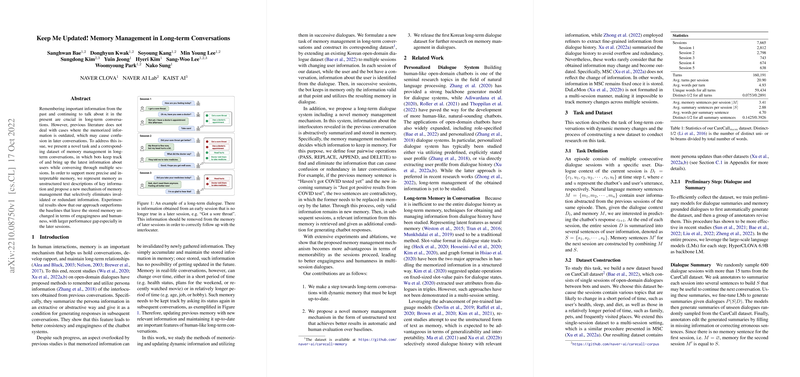Overview of "Keep Me Updated! Memory Management in Long-term Conversations"
The paper "Keep Me Updated! Memory Management in Long-term Conversations" presents an in-depth exploration of memory management within multi-session dialogue systems. The authors introduce a novel approach aimed at recognizing and updating dynamic user information critical in long-term human-chatbot interactions. This research directly addresses the gap in previous studies where the memorized information remains static, potentially becoming contradictory or redundant as conversations progress.
Key Contributions
The focal points of the paper are as follows:
- Novel Task Conceptualization: The authors propose a new task explicitly focused on the dynamics of memory management in chatbots. This task involves accurately tracking and updating user-specific information across conversation sessions, enhancing the chatbot's engagement and humanlikeness.
- Dataset Development: To facilitate research in this area, the authors extend the existing Korean open-domain dialogue dataset to create a multi-session dataset named CareCall. This dataset is characterized by its inclusion of dynamically changing user information across different sessions.
- Unstructured Memory Representation and Management: The proposed system utilizes unstructured text to represent memory, thereby enhancing interpretability and flexibility. The memory management mechanism employs operations (PASS, REPLACE, APPEND, DELETE) designed to process the evolving nature of memorized information effectively.
Methodology
The dialogue system proposed by the authors incorporates three primary components:
- Memory Grounded Response Generation: It builds on historical dialogue context and the current memory state to generate responses, with a focus on relevant and updated memory excerpts.
- Dialogue Summarization: This component distills key user information at the end of each session, generating summaries for integration into the memory system.
- Memory Update Process: The paper introduces a structured algorithm to update memory by comparing new information with stored memory, utilizing predefined operations to resolve inconsistencies or redundancies.
Experimental Evaluation
The performance of this system was evaluated through extensive experimentation. Notably, the memory update mechanism demonstrated robust improvements in maintaining engagement and consistency over time. The extensive human evaluations showed that dynamic memory management significantly enhances chatbot qualities such as engagingness and humanness, especially in later sessions. A quantitative analysis highlighted that the updated memory strategy outperformed simple memory accumulation methods, evidenced by superior perplexity and BLEU scores.
Implications and Future Directions
This paper makes a significant contribution to the field of AI-driven conversational systems by addressing memory management with a more human-like updating mechanism. The findings have promising implications for practical deployment and interaction design of intelligent virtual assistants, enhancing contextual awareness and information accuracy over prolonged interactions.
Future research may explore the integration of these strategies within multi-lingual settings, handling more complex dependencies between memory items, and optimizing the computational efficiency of memory operations, especially for long-term memory management.
Conclusion
The paper advances our understanding of conversational memory management through dynamic user information updates. It proposes a pragmatic system architecture that significantly enhances the fidelity of long-term human-chatbot interactions. This research lays critical groundwork for future advancements in personalized AI communication systems.
